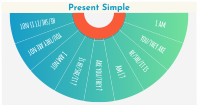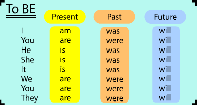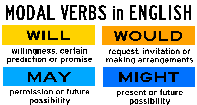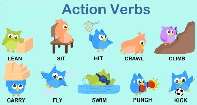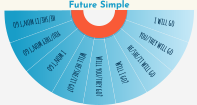Change Avatar
Simple Future Tense
Simple Future Tense
What is a verb tense?
A verb tense tells us when the action happened - an action or past state of being (i.e. a to be verb).
There are 3 simple verb tenses we are going to learn about:
#1 - Present tense means something that is happening NOW!
#2 - Past tense means that something already happened.
#3 - Future tense means something is going to happen in the future.
HINT! What’s a to be verb? Here’s a reminder:

What is Simple Future Tense?

Future tense means something that will happen in the future.
Examples:
• I will go to school tomorrow.
• You will eat four cookies after dinner.
• We will read for one hour for homework.
• They will be tired next week.
How do you form the Simple Future Tense?
Whether the subject is singular or plural, you can form the simple future with this formula:
WILL + root form of verb
Examples - I will go to school in the morning.
You will eat at the table
We will sleep in the tent.
But, there’s another common way to show something that will happen in the future:
[AM/IS/ARE] + GOING TO + root form of verb
Examples - I am going to get a car for my birthday.
She is going to be exhausted from running a mile.
They are going to sing in the concert.
How do you make the Simple Present Negative?
To make the simple present negative, you use:
WILL + NOT + root form of verb
Examples - You will not go today because it may rain.
It will not be enough time to finish the puzzle.
or you can use the contractions
AM/IS/ARE + NOT + GOING TO + root form of verb
Examples - I am not going to go because it may rain.
She is not going to run outside.
How do you ask a question in the simple perfect tense?
It’s easy! Just use:
WILL + subject (noun or pronoun) + root form of verb
Examples - Will Charli remember to read her book?
Will we go to the park tomorrow?
When will we eat dinner?




